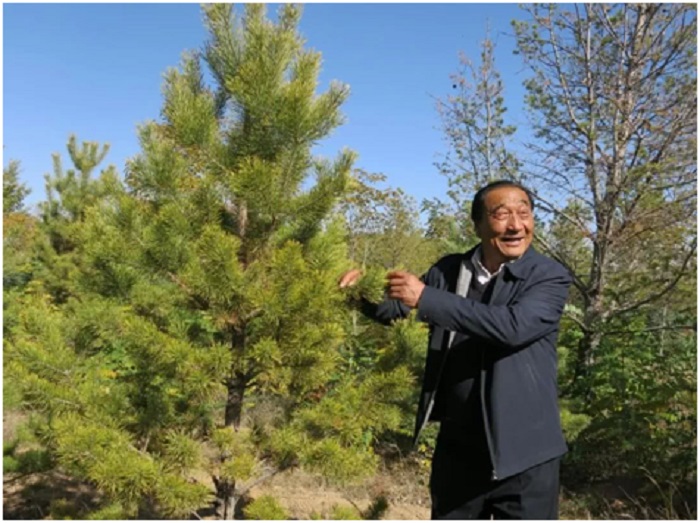



Shi Guangyin, a farmer in Dingbian county, Yulin city, northwest China’s Shaanxi province, has recently received the July 1 Medal, the highest honor in the Communist Party of China (CPC), for his outstanding contributions to desertification control.
Residents in Yulin had long been plagued by heavy winds, floating sand, and barren land mainly due to the Maowusu Desert, China’s eighth largest desert, located between Yulin city and Ordos of north China’s Inner Mongolia autonomous region. The desert accounts for 56.1 percent of the area of Yulin city.
In the 1950s, local people in Yulin started to tame the desert by afforestation. So far, 93.24 percent of the desertified land in the city has been put under control, all the 8.6 million mu (about 573,333 hectares) of quicksand in the city has been fixed or semi-fixed, and large areas of exposed sand can barely be spotted now, to which Shi has contributed a considerable part.
At the beginning of 1984, after China rolled out policies to encourage individuals to sign contracts with the government to combat desertification, Shi entered into a contract with the local government for desertification control of 3,000 mu of land, becoming the first person who signed such a contract in Yulin.
Over the past more than 30 years, a group of local people led by Shi have braved innumerable trials and hardships and planted and kept alive more than 53 million arbors and shrubs in 250,000 mu of barren sand and alkali beaches, finally building a “green Great Wall” that stretches more than 50 kilometers at the south of the Maowusu Desert.
The “green Great Wall” has completely changed the harsh natural conditions of the area and yielded significant social, ecological, and economic benefits.
While fighting desertification, Shi has also tried to help families in straitened circumstances and bring benefits to local residents. He came up with over 1.2 million yuan ($185,760) to build two schools and an ecological relocation village, and provide financial assistance for more than 300 households.
Because of his contributions and devotion to desertification control, Shi has been awarded honorary titles including China’s “national model worker,” “national desertification control hero” as well as “outstanding farmer” by Food and Agriculture Organization of the United Nations. He is also called “Uncle in the Desert” by local people.
For desertification control, Shi and his family moved to Sidahao village, with the largest area of barren sand in Haiziliang township of Dingbian, in 1984, and began planting trees there. Although over 85 percent of the trees he planted survived that year, 90 percent of the saplings were swallowed by wind erosion and sandstorm merely one year or two later.
Instead of being discouraged by the setbacks, Shi realized that he was being foolhardy to start off for the task with only enthusiasm but the right methods. He therefore consulted technicians at the forestry bureau of Dingbian about desertification treatment, and learned from the experience of Hengshan district of Yulin and other places in controlling sand.
After acquiring and adopting scientific methods, Shi and his team set up 800 kilometers of sand-protecting barriers on 6,000 mu of barren sand, and eventually brought the survival rate of the saplings they planted above 80 percent.
By the end of 2004, the 250,000 mu of barren sand and alkali beaches Shi had been working on had seen a grass and forest coverage of over 90 percent, reflecting effective management.
After 2000, considering that the shrubwoods he planted before have a short lifespan and low economic and ornamental value, Shi started to transform such low-yielding forests. He has so far planted over one million high-quality species, which are mainly pinus sylvestris.
To make desertification control be carried on for generations, Shi set up a company that adheres to a development strategy featuring controlling and utilizing barren sand and follows a path that links the company with rural households and various bases, aiming to increase people’s income while fighting desertification.
With such strategy and path, Shi established more than ten economic entities, including pasture, dairy farm, purified water factory, as well as tourist attraction. His company now sees an annual income of over 3.4 million yuan from ecological subsidies and economic benefits of plants grown under trees.


The Humanitarian Service Diamond Awards has.
A Chinese Company, Inner Galaxy Steel.


The Programme Coordinator, Regulatory, Compliance and.


A Non-Governmental Organization (NGO), Committee for.
The Trustfund Pensions Limited has chided.


The House of Representatives Committee on.
The China General Chamber of Commerce.


Senator Chuka Utazi who represented Enugu.


An Abuja based Legal Practitioner, Ugochukwu.


The African business community in Yiwu,.
Leave a Comment